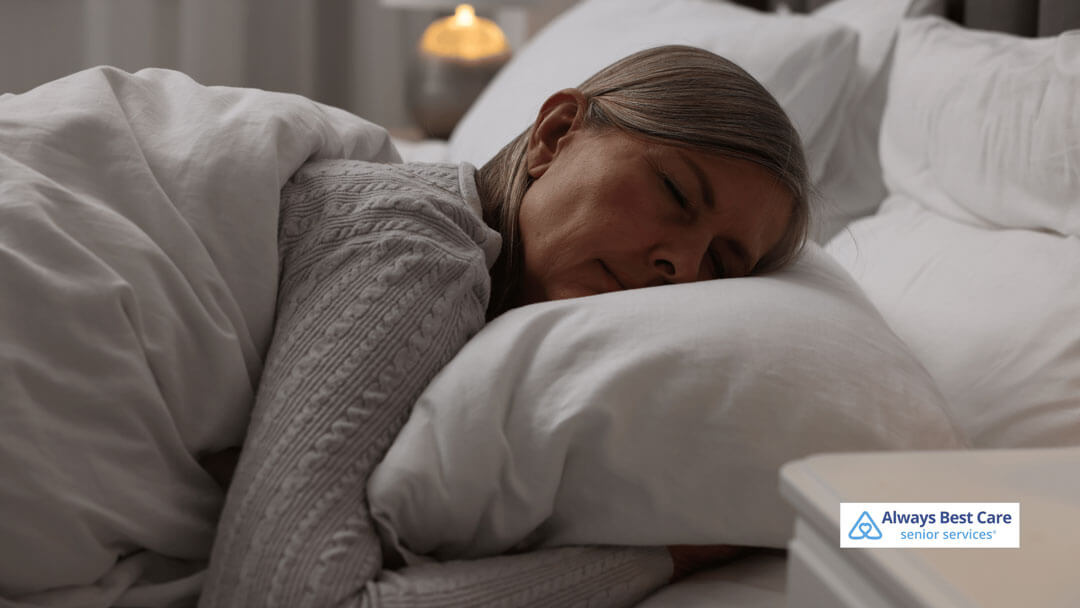How Seniors Can Sleep Better: 8 Essential Tips

Getting a good night’s sleep is vital for seniors. Quality rest can improve mood, boost cognitive function, and support overall health.
However, many older adults face challenges when it comes to sleeping well. From creating a comfortable environment to managing stress, there are several strategies seniors can adopt to improve their sleep quality.
Here are eight essential tips to help seniors get the rest they need.
Table of Contents
Why Good Quality Sleep is Important for Seniors
Good quality sleep is essential for everyone, but it becomes increasingly important as we age.
For seniors, sleep not only impacts how they feel throughout the day but also plays a critical role in overall health and well-being. Poor sleep can lead to a range of physical and mental health issues, including weakened immunity, increased risk of heart disease, and higher susceptibility to falls and injuries.
A solid night’s sleep allows the body to repair itself, strengthen the immune system, and regulate hormones. It also supports brain function, helping to maintain memory and cognitive abilities, which can naturally decline with age.
Furthermore, good sleep can reduce irritability, stress, and anxiety, promoting a more balanced mood and emotional well-being.
1. Optimize Your Sleep Environment for Better Rest
A peaceful and comfortable bedroom is key to falling asleep and staying asleep.
Ensure that the room is dark, quiet, and cool. Investing in a supportive mattress and soft, breathable bedding can significantly affect sleep comfort.
Some seniors may also benefit from using a white noise machine or earplugs to block out disturbances, especially if their home environment is noisy.
2. Establish a Consistent Sleep Schedule
Going to bed and waking up at the same time each day helps regulate your body’s internal clock. This consistency signals to your brain when it’s time to sleep and when it’s time to wake up.
Avoid sleeping in or staying up too late, even on weekends. Over time, this routine can make falling asleep easier and improve the quality of rest.
3. Watch What You Eat and Drink before Bed
What you consume before bed can affect how well you sleep.
Avoid large meals, caffeine, and alcohol late in the evening. Instead, opt for a light snack if you’re hungry. Eating too much right before bed can cause discomfort, while caffeine and alcohol can disrupt your sleep cycle.
Also, drink enough water throughout the day, but limit fluids closer to bedtime to prevent frequent trips to the bathroom.
4. Stay Physically Active during the Day
Engaging in physical activity during the day can make it easier to fall asleep at night.
Even light exercise, such as walking or stretching, can improve sleep quality. However, avoid vigorous activity close to bedtime, as it might leave you feeling too energized to wind down.
5. Manage Stress and Anxiety for Relaxation
Stress and anxiety can make it hard to fall asleep or stay asleep through the night.
Practicing relaxation techniques such as deep breathing, meditation, or gentle yoga can help calm your mind before bed.
It’s also helpful to create a bedtime routine that encourages relaxation, such as reading or listening to soothing music, to ease your way into sleep.
6. Limit Daytime Naps for a Better Night’s Sleep
While napping during the day is tempting, long or late naps can interfere with nighttime sleep.
If you need to rest during the day, limit naps to 20-30 minutes and avoid sleeping in the late afternoon. Keeping naps short and early in the day ensures you’ll feel tired enough to sleep at night.
7. Create a Pre-Sleep Routine
Establishing a calming routine before bed signals your body that it’s time to wind down.
Activities such as taking a warm bath, reading a book, or practicing relaxation exercises can prepare your mind and body for rest. Avoid screens and stimulating activities close to bedtime, as they can make relaxing harder.
8. Consult a Doctor About Sleep Issues
If you’re experiencing ongoing sleep difficulties, it may be time to consult a healthcare professional.
Sleep apnea, restless leg syndrome, or chronic insomnia can affect sleep quality. A doctor can help identify any underlying issues and recommend treatments or therapies to improve your sleep.
How Always Best Care of Dallas Can Help with Sleep Challenges
Always Best Care of Dallas provides comprehensive support for seniors, including personalized care plans that can help address sleep challenges. Our team of trained caregivers understands the unique needs of seniors and works to create an environment conducive to better rest.
Here are some ways we can assist:
- Assisting with Bedtime Routines: Our caregivers can help seniors establish calming bedtime routines, such as preparing the bedroom, assisting with hygiene tasks, or ensuring that seniors feel comfortable and relaxed before bed.
- Medication Reminders: Our caregivers provide timely medication reminders for seniors on prescribed sleep medications or treatments for conditions like sleep apnea to ensure consistent usage, contributing to more effective rest.
- Nighttime Monitoring: For seniors who experience sleep disruptions or are at risk of falls during the night, Always Best Care offers overnight care services. Caregivers can monitor and assist seniors with restroom visits, ensuring safety and peace of mind.
- Managing Stress and Anxiety: Our caregivers help create a calming, stress-free environment by offering companionship and emotional support. They can guide seniors through stress-relieving activities, such as light stretching or breathing exercises, before bed.
- Promoting Healthy Habits: Through assistance with meal planning and exercise routines, Always Best Care helps seniors adopt healthy habits that support better sleep, such as eating balanced meals and staying active during the day.
Unlock Better Sleep Today: Contact Always Best Care Dallas for Personalized Senior Sleep Solutions!
Always Best Care of Dallas is committed to enhancing the overall well-being of seniors, and their personalized care services can make a real difference in improving sleep quality.
Contact Always Best Care of Dallas at (469) 807-8982 to learn more and schedule your free consultation.





